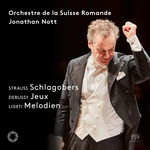|
Back
09/02/2018
Richard Strauss: Schlagobers (Whipped Cream) Ballet Suite, opus 70a
Claude Debussy: Jeux, L. 126
György Ligeti: Melodien
Orchestre de la Suisse Romande, Jonathan Nott (conductor)
Recording: Victoria Hall, Geneva, Switzerland (June 2018) – 72’35
Pentatone # SACD PTC 5186 721 (Distributed by Naxos of America) – Booklet in English and German

   
Jonathan Nott’s choice of these 20th century works is tailor-made for the Englishman since he relishes such eclectic pieces. Cutting through a strata of musical ideologies, Pentatone’s recording begins on a pleasantly post-Romantic note, only to finally succumb into a land of abstract wilderness.
Nicknamed the “Billionaire’s Ballet”, Richard Strauss’ délicieuse pâtisserie never garnered broad support since Europe was reeling from World War I’s devastations while wealthy patrons, ironically, doled out endless cash to foot the bill for the 1924 premiere. Last century’s luxuries fortunately resurfaced when Orange County’s Segerstrom for the Performing Arts Center hosted The World Premiere of Mark Ryden's over-the-top 2017 production of Schlagobers featuring the American Ballet Theatre.
Strauss’ recipe re-enlists earlier ingredients, though Schlagobers swirls about inside its own sugary tone and magnanimity. The ballet’s full impact is better retrieved through a visual, but in this case, the audio-only approach, served by the Orchestre de la Suisse Romande, lends itself to a justifiable experience. [Note: Pentatone issues this truncated opus 70a compendium versus the more lengthy TrV 243a ballet suite encompassing Act I and Act II under M. Nott’s predecessor, Neeme Järvi.]
A “ballet in two acts”, Schlagobers is a caked invention, infectiously sprinkled with soufflé lightness and frequently iced with climaxes of bombastic, weighty percussion and grandiose brass annunciations. Because Schlagobers rarely surfaces, Pentatone’s inclusion of a synopsis would have added more continuity, yet merely sitting back and enjoying [this] as confectionary background is sufficient to gather Richard Strauss’ digestive message.
The Suite seems to drag with artificial lustre (and absence of a rich base injection) until the conclusive “Finale, Allgemeiner Tanz” is reached: here’s where M. Nott and his orchestra gather immeasurable steam…too bad the snowballed, frothy tempo is discovered so late.
Turning the page to Debussy’s subsequent Jeux, one is immediately aware of a change in acoustical pronouncements, and it is decidedly incisive in nature. Jonathan Nott chooses to temper the pace in order to sensualize the erotic. Pregnant pauses add superior introspection, gnawing away at the Diaghilev drama while plowing forward to pick away at the enigmatic and alluring nuances of this poème dansé. M. Nott achieves the ultimate statement.
György Ligeti’s Melodien may be deemed a supernova inside another galaxy and apart from his Le Grand macabre. As jarring as it might portray, the piece holds and grabs. It’s as if we’re settling down inside the Adler Planetarium and listening to a stellar narration of Carl Sagan's Cosmos. Atmospheric “zoning out” becomes our reality, and it marches back to Stockhausen…and it works: the Suisse Romande’s introductory strings create a rare harmonic oscillation that freezes our attention. A mesmerized outlook drags one deeper into The Black Hole. The strings elate with pristine generation, creating notes which cycle inside their own distinguishable and eerie orbit. Melodien rockets one into musical existentialism.
Christie Grimstad
|